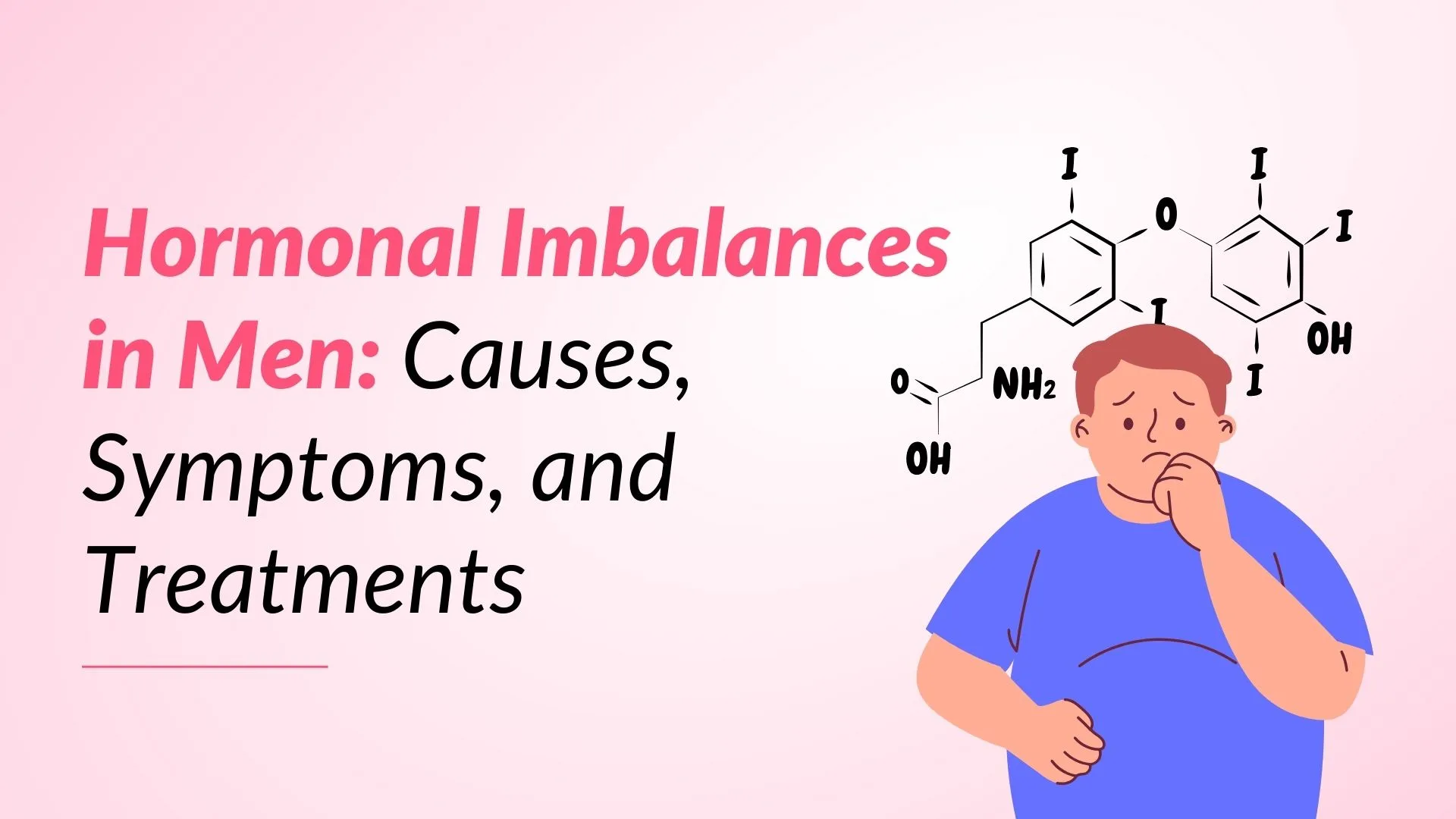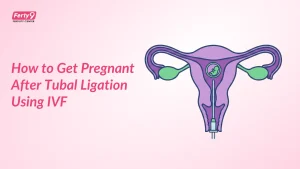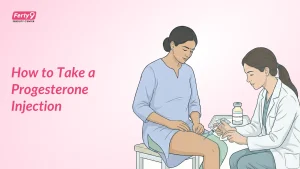Hormones are tiny chemical messengers found in our body that play a significant part in health and wellness. They coordinate many body activities by sending messages through our bloodstream to our muscles, organs, and other tissues, directing our body to what needs to be done. Hormonal abnormalities can impact both men and women, including growth hormones, insulin, and adrenaline. Hormonal imbalances in men result when hormone levels in the blood are excessively high or low. Aging is widely considered to cause diminishing vitality and changes in body functioning, sleep cycles, and other energy-related metrics.
However, most people are unaware that a ‘hormonal imbalance in men’ is the underlying cause of these changes. It can have a negative impact on their metabolism, muscle strength, and emotional well-being.
Understanding Hormones and Their Role in Male Health
Hormones are essential for regulating different bodily activities, and hormones such as testosterone are especially crucial in men. Understanding the impact of hormones on men’s health and knowing how to identify and treat hormonal imbalances can significantly enhance overall well-being. Managing and preventing hormonal disorders requires regular consultations with your healthcare experts. The key hormones include
- Testosterone: Male sex hormones are primarily testosterone. It is responsible for developing muscle mass, body hair, bone density, and male reproductive tissues.
- Cortisol: Cortisol, sometimes referred to as the stress hormone, aids in blood sugar regulation, inflammation reduction, and metabolic regulation.
- Growth hormone: Essential for metabolism, cell division, and growth.
- Thyroid hormones: Controls weight, energy levels, and metabolism.
- FSH, or follicle-stimulating hormone: Encourages the testes to produce more sperm.
- Luteinizing hormone: Testosterone production is triggered by the luteinizing hormone (LH).
- Estrogen: Although estrogen is thought to be a feminine hormone, men can also create small amounts of this hormone, which is crucial for some body processes.
Hormonal imbalances in men can cause fatigue, mood swings, decreased muscular mass, and low libido. Hormonal disbalance in males may also lead to sleep disturbances, low energy levels, and mood changes. Hormonal changes in men might affect their physical performance, mental health, and overall vitality.
Common Hormonal Imbalances in Men
Hormone issues in men fluctuate over time, but hormone imbalance symptoms can also be caused by stress, injury, sickness, poor nutrition, or a lack of exercise. Hormonal changes in males can affect growth, mood regulation, and overall health at various periods of life. This can happen at any point, but it happens more frequently as people get older. The most common hormonal abnormality in men is the fluctuation in testosterone levels. Since hormones are essential for many body processes, men may experience many symptoms that point to a hormonal imbalance. Depending on which hormones or glands are impacted, these symptoms may differ.
Low Testosterone (Hypogonadism)
Testosterone is an important hormone for male quality of life, longevity, and good health outcomes. Low testosterone, commonly known as hypogonadism, is a disorder in which the body does not create adequate testosterone. Adequate testosterone levels are required for muscle growth, strength, and bone density. Low testosterone can cause osteoporosis and increased body fat. Symptoms of hormonal imbalance in men include loss of libido, erectile function, and sperm production. Low levels can lead to reduced sex drive and fertility difficulties. Hormone levels affect mood, energy, and cognitive function. Imbalances can lead to fatigue, depression, and irritability.
High Estrogen Levels
The impact of estrogens begins in prenatal life, when excessive estrogen exposure may alter the development of some tissues of the male reproductive system . Estrogen, along with testosterone, plays an important function in male sexual growth and development. Any imbalance between the hormones can impact the overall health. High estrogen levels can arise from a variety of causes, including particular drugs, lifestyle choices, and liver conditions. Symptoms of high estrogen imbalances in males c an develop a variety of health problems, including infertility, erectile dysfunction, and swollen breasts.
Thyroid Disorders (Hypothyroidism/Hyperthyroidism)
An hyperactive thyroid gland can boost your metabolism and create excessive amounts of thyroid hormone. Underactive thyroid glands, leading to poor production of thyroid hormones, can induce hypothyroidism. In males, thyroid disorders such as hypothyroidism (underactive thyroid) can present as fatigue, weight gain, dry skin, cold intolerance, muscle weakness, reduced hair growth, and mood swings. While hyperthyroidism (overactive thyroid) can cause rapid weight loss, anxiety, elevated heart rate, sweating, irritability, and potential erectile dysfunction, both conditions can affect fertility by affecting sperm count and quality.
Cortisol Imbalance (Stress Hormone)
A cortisol imbalance, or abnormally high levels of the stress hormone cortisol, can harm male reproductive health by suppressing testosterone production, which may result in decreased sperm quality and quantity . Symptoms of hormonal imbalance include anxiety, exhaustion, and weight gain. Additionally, it can result in major health issues like obesity and early aging. It can also cause erectile dysfunction by interfering with men’s normal sexual response cycle.
Prolactin Disorders
Male reproductive health can be impacted by elevated blood levels of prolactin, which can result in symptoms of hormonal imbalance in men, s uch as erectile dysfunction, decreased sex drive, and infertility. This condition is known as hyperprolactinemia. One of the endocrine conditions known to affect male infertility is hyperprolactinemia. About 1% of people globally suffer from this widespread medical problem. A high blood prolactin level of greater than 15 µg/L is indicative of hyperprolactinemia in men.
Causes of Hormonal Imbalances in Men
Over time, everyone’s hormones naturally fluctuate or become unbalanced. However, endocrine gland dysfunction may also be the cause. The endocrine system produces, stores, and releases hormones into the bloodstream.
Hormonal imbalance can also be caused by
- Type 1 and type 2 diabetes
- Hypothyroidism, or an underactive thyroid
- Hyperthyroidism, or an overactive thyroid
- Hypogonadism
- Cushing syndrome, or high levels of cortisol
- Congenital adrenal hyperplasia, which causes low levels of cortisol and aldosterone
- Addison’s disease
- Stress
- Poor nutrition
- Allergic reactions
- Pancreatitis
- Anorexia
Symptoms of Hormonal Imbalances
The symptoms of hormonal imbalances in men include
- Unexpected, abrupt weight loss
- Excessive sweating
- Difficulty sleeping and headaches
- Variations in sensitivity to heat and cold
- Skin rashes or dry skin
- Variations in blood pressure and heart rate
- Depression, anxiety, and irritability
- Frequent urination and increased thirst
- Weak or brittle bones
- Long-term, inexplicable fatigue
- Decrease in sex drive
- Erectile dysfunction
- Gynecomastia (breast enlargement)
How Hormonal Imbalances Impact Male Fertility and Overall Health?
Hormonal imbalance in men clinically presents with symptoms like low sex drive, erectile dysfunction, fatigue, mood swings, and changes in body hair distribution. It can also have a major impact on their fertility by interfering with sperm production and quality, which frequently results in decreased sperm count, poor motility, and abnormal sperm morphology.
Diagnosing Hormonal Imbalances in Men
Blood tests, urine tests, imaging investigations, and other procedures can be used to evaluate male hormonal abnormalities. Common tests include testosterone levels, thyroid function tests, and cortisol levels. Since your endocrine glands produce hormones straight into your blood, medical professionals usually conduct blood tests to measure your hormone levels. Because some hormone levels fluctuate significantly during the day, doctors might prescribe additional tests, such as an insulin or glucose tolerance test, to assess your levels.
Treatment Options for Hormonal Imbalances
Depending on the cause, treatment for a hormonal imbalance varies. Diet, exercise, lifestyle modifications, and hormone replacement therapy are among the options for treating male hormonal abnormalities.
Lifestyle Modifications
Diet, exercise, sleep, stress management, abstaining from harmful substances like alcohol and tobacco, and treating long-term medical issues are some lifestyle modifications that can help men with hormone imbalance.
Hormone Replacement Therapy (HRT)
Hormone replacement therapy (HRT) for men is a medical treatment that promotes hormonal balance, particularly testosterone levels. It can alleviate symptoms of low testosterone, such as fatigue, low mood, and sexual dysfunction.
Medications and Supplements
Certain supplements may also help balance hormones, but it is critical to check with a doctor before beginning any new supplement regimen. Vitamin D, zinc, omega-3 fatty acids, B vitamins, and ashwagandha are some medications and supplements that may help with hormonal imbalances in men.
Alternative Therapies
Some people find that yoga relieves symptoms of hormone imbalance. Yoga is excellent for improving your strength, flexibility, and balance. It may also help with weight loss and hormone regulation. You may also make the following lifestyle changes, such as losing weight and having a well-balanced diet, which are vital for both reproductive and general health.
Preventing Hormonal Imbalances in Men
- A balanced diet of healthy fats, whole foods, and lean proteins promotes hormonal health.
- Regular exercise, both strength and cardiovascular, helps to maintain healthy hormone levels.
- Mindfulness, meditation, and other stress-reduction practices can help manage cortisol levels.
- Regular health check-ups and screenings can detect abnormalities early, allowing for appropriate intervention.
- Managing your chronic health conditions well
- Quitting smoking and limiting alcohol intake
Conclusion
Hormones regulate several bodily functions. When hormones become imbalanced, the symptoms can be highly diverse. Hormonal imbalances can lead to several issues, so seek treatment as soon as possible. Talking to your doctor as soon as you witness any changes in your body or energy levels is an important step toward early treatment of a hormone imbalance.




























